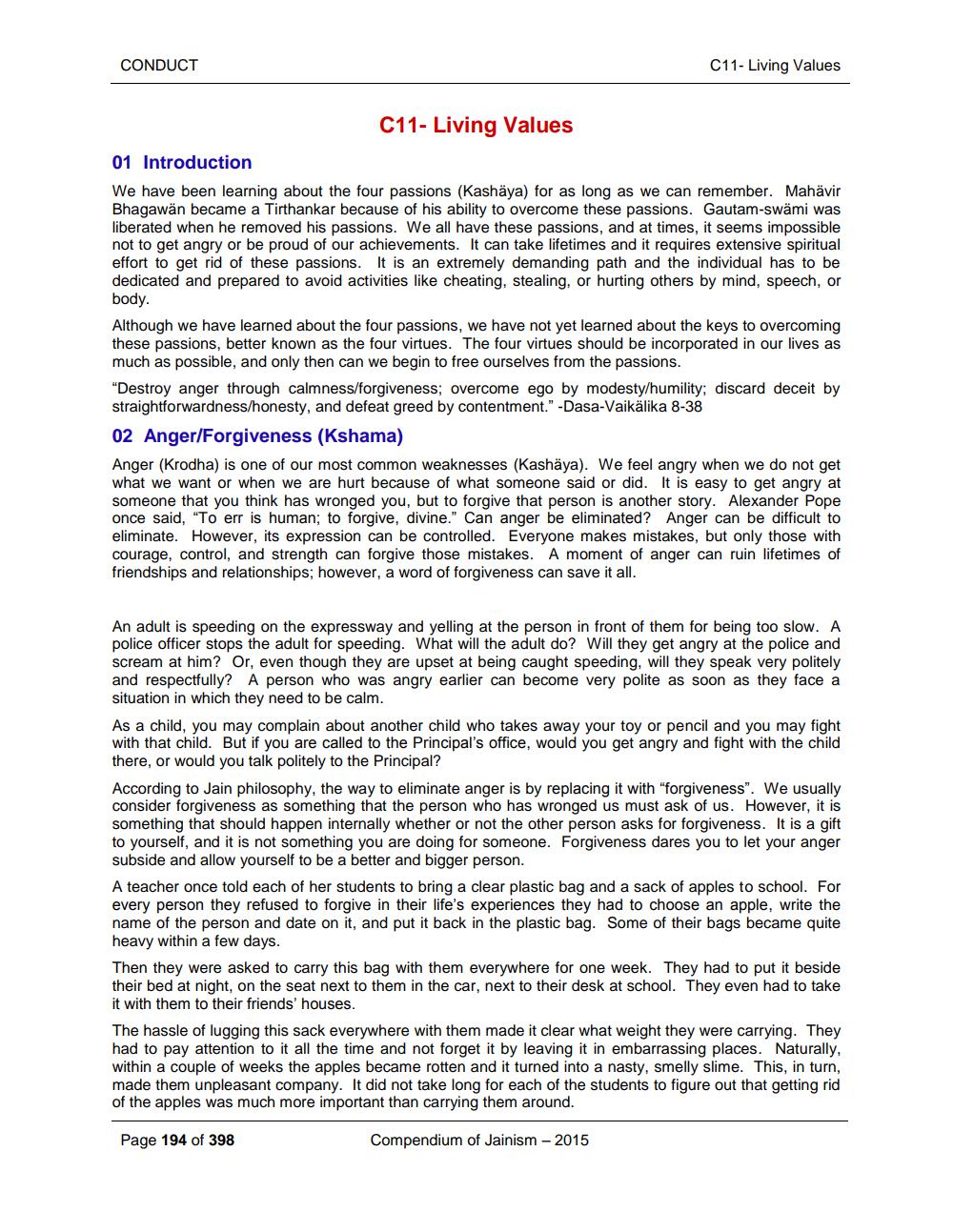________________
CONDUCT
C11- Living Values
C11- Living Values
01 Introduction We have been learning about the four passions (Kashaya) for as long as we can remember. Mahävir Bhagawan became a Tirthankar because of his ability to overcome these passions. Gautam-swami was liberated when he removed his passions. We all have these passions, and at times, it seems impossible not to get angry or be proud of our achievements. It can take lifetimes and it requires extensive spiritual effort to get rid of these passions. It is an extremely demanding path and the individual has to be dedicated and prepared to avoid activities like cheating, stealing, or hurting others by mind, speech, or body. Although we have learned about the four passions, we have not yet learned about the keys to overcoming these passions, better known as the four virtues. The four virtues should be incorporated in our lives as much as possible, and only then can we begin to free ourselves from the passions. “Destroy anger through calmness/forgiveness; overcome ego by modesty/humility; discard deceit by straightforwardness/honesty, and defeat greed by contentment." -Dasa-Vaikälika 8-38 02 Anger/Forgiveness (Kshama) Anger (Krodha) is one of our most common weaknesses (Kashaya). We feel angry when we do not get what we want or when we are hurt because of what someone said or did. It is easy to get angry at someone that you think has wronged you, but to forgive that person is another story. Alexander Pope once said, "To err is human; to forgive, divine." Can anger be eliminated? Anger can be difficult to eliminate. However, its expression can be controlled. Everyone makes mistakes, but only those with courage, control, and strength can forgive those mistakes. A moment of anger can ruin lifetimes of friendships and relationships; however, a word of forgiveness can save it all.
An adult is speeding on the expressway and yelling at the person in front of them for being too slow. A police officer stops the adult for speeding. What will the adult do? Will they get angry at the police and scream at him? Or, even though they are upset at being caught speeding, will they speak very politely and respectfully? A person who was angry earlier can become very polite as soon as they face a situation in which they need to be calm. As a child, you may complain about another child who takes away your toy or pencil and you may fight with that child. But if you are called to the Principal's office, would you get angry and fight with the child there, or would you talk politely to the Principal? According to Jain philosophy, the way to eliminate anger is by replacing it with "forgiveness". We usually consider forgiveness as something that the person who has wronged us must ask of us. However, it is something that should happen internally whether or not the other person asks for forgiveness. It is a gift to yourself, and it is not something you are doing for someone. Forgiveness dares you to let your anger subside and allow yourself to be a better and bigger person. A teacher once told each of her students to bring a clear plastic bag and a sack of apples to school. For every person they refused to forgive in their life's experiences they had to choose an apple, write the name of the person and date on it, and put it back in the plastic bag. Some of their bags became quite heavy within a few days. Then they were asked to carry this bag with them everywhere for one week. They had to put it beside their bed at night, on the seat next to them in the car, next to their desk at school. They even had to take it with them to their friends' houses. The hassle of lugging this sack everywhere with them made it clear what weight they were carrying. They had to pay attention to it all the time and not forget it by leaving it in embarrassing places. Naturally, within a couple of weeks the apples became rotten and it turned into a nasty, smelly slime. This, in turn, made them unpleasant company. It did not take long for each of the students to figure out that getting rid of the apples was much more important than carrying them around.
Page 194 of 398
Compendium of Jainism - 2015




